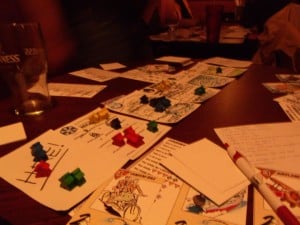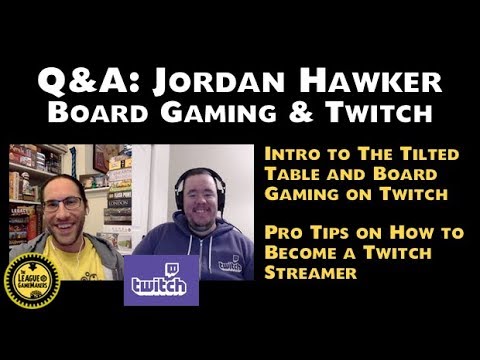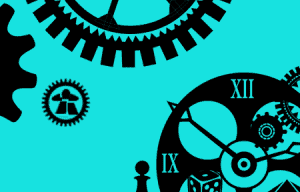
One of the coolest things about game design, in my opinion, is that whether you’re a solo designer or you’re part of a team, you need other people to help you round out your designs. From playtesters to the actual players of the finished product, people are an integral part of designing games. That’s part of why I love the League of Gamemakers – it gives me a chance to write about design, discuss my thoughts with others, and be a part of a community. Behind the scenes, we even talk about our games, pose design problems, and offer feedback. It’s a great thing to be a part of – but it’s not limited to just this one place.
In some areas, there’s a large and robust set of designers – a ready-made community. In other places, there might be nobody for miles, not even fellow gamers. But I believe that, with a little searching or some legwork, anybody can have a League of their own.
AS SOMEBODY WHO’S SPENT A LOT OF TIME TRYING TO BUILD A GROUP OF GAME DESIGNERS, I’VE LEARNED A BIT ABOUT HOW TO SEEK OUT A COMMUNITY OF DESIGNERS.
Pittsburgh Game Designers, the fledgling design group I help to run, is still small, but we’re growing. I find new designers in the area practically every month. But how am I finding them?
Where there are gamers, there are game designers.
If you’ve got a local gaming group, there are probably designers there. Check your local game store, colleges, and Meetup to see where gamers are congregating, then join them if you haven’t already. Ask your LGS owner if they know anybody who designs games. (If there’s one thing game designers love, it’s talking about their ideas!)
DO SOME INVESTIGATING AND YOU MAY JUST FIND THAT THERE’S ALREADY A POCKET OF GAME DESIGNERS JUST WAITING FOR YOU TO JOIN THEM.
The ultimate search: Google.
Have you tried putting “game design YOUR CITY” into Google yet? What about Board Game Geek? What about Facebook? There are small groups of designers in lots of different cities, and in many cases, they have some kind of digital presence. For example, when you try “game designers in Pittsburgh,” you get the Pittsburgh Game Designers Facebook page. (This list from James Mathe’s blog is a great starting place!) You can also try looking for playtester groups. Where there are playtesters, there are often game designers lurking just under the surface, waiting for an excuse to start their own design.
BUT WHAT IF THERE’S REALLY NOBODY DESIGNING GAMES IN YOUR AREA?
Okay, so you’ve looked high and low and you really can’t find a game designer or design group meeting near you. You can definitely build your own group from scratch, or take advantage of existing resources to find some support.
Find those gamers.
Game groups often have plenty of designers…even if they don’t know it yet. You can spot the burgeoning designers because they’re the ones who have house rules for their house rules. They can spot a broken mechanic from a mile away, and they already know how to fix it. They might not have designed a game yet, but they probably have tons of ideas on how to make your design better. If they’re anything like the people I know, after a few sessions of looking at your game, they’ll go off and design their own.
GAME GROUPS OFTEN HAVE PLENTY OF DESIGNERS…EVEN IF THEY DON’T KNOW IT YET.
If you’re feeling motivated, you could even attend a Protospiel or other gamer convention. Protospiels are conventions centered around playtesting new designs. You may be able to find designers who are at least in your vicinity, even if they’re a bit of a drive away. “Regular” gaming conventions (you know, where you sit down and play already-published games) often have designers hoping to grab playtesters after hours or in hallways and lobbies. If you spot a game that looks interesting (or homemade), ask who designed it. With a little online sleuthing, you might even be able to find out in advance if any game designers will be there.
Start your own design night.
Pittsburgh Game Designers started with a handful of meetings to playtest games. We realized that, between the four initial members, we had something like ten games that needed to be tested. We invited our playtesting friends for one big playtest night, and magic was born. Try partnering with your LGS to host a design night, or get permission to host playtesting nights at a local bar or restaurant. If you have a local game group, ask if they’d be willing to promote an event or help you host it. Starting small is better than never starting.
For example, Pittsburgh Game Designers is partnering with a local gaming cafe and arcade, Victory Pointe, to host regular game design nights. We’ll get to use the space for free to talk shop, host playtest nights, have small game jams, and even hold small lectures and learing events. All that the owner asks is that we buy food and drinks there.
Host an event.
If you want to make a bigger splash, you could try hosting a game jam or even a Protospiel. Game jams bring people together to design games in short period of time, often a day. Get local gamers to come try their hand at designing a game. You can make this as cheap and easy as you want, though you’ll have to do some legwork to advertise it.
You could also consider hosting a Protospiel, which is a larger-scale playtesting event. You just find a hotel or other location that can hold lots of tables, set up a page to take pre-registrations, and advertise it. If you’re fairly centrally-located, you’ll likely be able to get people to come.
Lots of collaborations started online.
Not every partnership or game design group started online, but I know of at least a handful that did. There’s nothing stopping you from working with somebody on the other side of the country or even in a totally different one. Thanks to webcams and the ubiquity of online storage space, collaboration has never been easier. However, you’ll want to make sure you’ve got a clear idea of what you’re getting into. Eduardo Baraf, designer of Lift Off! Get Me Off This Planet! and the upcoming The Siblings Trouble (designed with long-distance codesigner Kim Robinson), suggests that people looking to design long distance…
- Make sure expectation are clear from the beginning.
- Make sure all parties have short term and long term incentives.
- Be passionate.
Make game design forums your “silent partner.”
As Odd Hackwelder, designer of Monster Deck 55, said, “I believe a lot of us are already working with other designers when we comment on their ideas in groups such as the Card & Board Game Designers Guild. I have been told many times someone used my advice in a design project, that is almost like being a silent partner in a business.”
Using a game design forum for feedback and inspiration might not be the same as working with a physical person, but it can still be extremely valuable. You’ll get a variety of different people giving you feedback on aspects of your design, and you can learn from others’ mistakes and successes. In fact, the League of Gamemakers is currently working to build a resources tab with links to online game design forums, Facebook groups, Twitter hashtags and more, to help designers better connect with others in their area and beyond.
Part of the fun of designing a game is working with others to polish it and make it great.
HAVING A COMMUNITY OF PEOPLE WHO SHARE YOUR INTERESTS GIVES YOU A VENUE FOR LEARNING MORE ABOUT THIS AMAZING HOBBY AND CAN BE EXTREMELY REWARDING.
If you feel like you’re missing that community, take a look and see what you can find. Building connections has never been easier, and as more people start designing games, our community will only become stronger.
Are you part of a local design group? Post it in the comments, because who knows? Maybe this article will help you find more designers. Not part of a group? Let us know where you’re from in the comments and perhaps you’ll make a connection.








